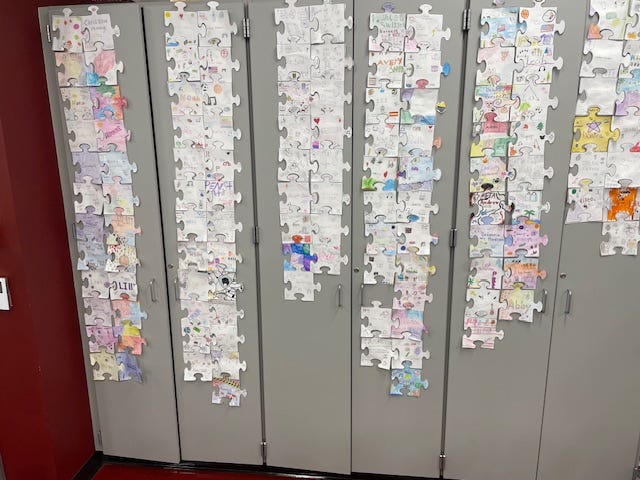Puzzled
Getting back to simpler times
“The art of simplicity is a puzzle of complexity.”
-Douglas Horton
The older I get, the more I like doing jigsaw puzzles. As a kid I never had much patience for them due to the fact that I could never sit still for more than a few minutes at a clip, but it wasn’t as though we never had them at 1261 Bunts Road. Our dining room table was the usual spot, whether it was for a puzzle we were doing just for fun, or one of the epic Fox/Asmus puzzle battles was taking place—more on them later—jigsaw puzzles were certainly a part of my youth.
The earliest jigsaw puzzles date back to the 1760s in England where they were originally used as a tool to teach geography. As time passed they grew in popularity, and by the 1930s began to be fashioned out of cardboard, making them cheaper and more available to the general public. Prior to the introduction of household televisions, jigsaw puzzles were commonplace in most American homes, and while technology has made them less popular today, they experienced a bit of a renaissance during the Covid-19 Pandemic.
Jigsaw puzzles require various skills from those who subject themselves to the process. Without these basic traits it’s tough to be successful. Ironically, the jigsaw puzzle skill set is also applicable to life.
Patience. Without it, you’re sunk. From turning all the pieces over to searching for that last elusive part of the border, if you are easily frustrated when you can’t find something, maybe Monopoly is a better option for your leisure time.
The ability to place pieces in the correct spots. This oft-overlooked talent is essential. Sometimes you need to really focus in on the picture located on the box in order to determine if you are looking at the correct shade of blue or green covering the tiny piece in your hand.
The ability to drop one piece and move on to another. I often fall into the tunnel vision trap whenever I am determined to place one piece. I begin to stare at one area, absolutely certain that’s where the puzzle piece belongs. Sometimes you just need to pick up another and move on for the sake of your sanity.
Teamwork. I always find that praising the placement of a piece goes a long way. You gotta be a team player when it comes to puzzles because there is way more satisfaction working together than by yourself. I mean, who will you celebrate with when that last piece is placed?
The ability to work under pressure. Never was this more important than when our family would go head-to-head against the puzzle-savvy Asmus clan, who lived across the street from us for many years. Spearheaded by my mom and her good friend Mary, our families would select two identical 1,000 piece puzzles and see who could complete theirs first. My mother even repurposed an old trophy, affixing a large jigsaw puzzle piece painted in gold to the top. Rules were simple, anyone could come and help in the completion of the puzzle, and each side—carrying a white flag of truce—was allowed to check on the progress of the other team only one time. The Asmus family was a jigsaw juggernaut and demolished us both times.
The ability to step away from technology. The addiction caused by the little supercomputers we carry with us everywhere certainly causes us to lose our focus. I’d say right now is the perfect time for more puzzles if it means less screen time for all involved.
The capacity to keep track of all pieces. It’s happened to everyone at some point. You get to that coveted final piece and it is nowhere to be found. My oldest daughter once found one in my parents bathroom. Some have been found in sweeper receptacles, and many have been found between couch cushions. When it comes to some of life’s worst aggravations, not having that final piece is right up there.
One of my favorite analogies for jigsaw puzzles is that they are much like a sports team. Every piece matters. Some will certainly stand out more than others, seeming more important than a a basic, non-descript, solid-colored piece. But at the end of the day, every piece is needed for completion. There is no piece above the other, because if you are missing just one, that spot creates a void that becomes all too noticeable. My colleague, Makenzie, uses a similar concept each year when she describes each student as a puzzle piece that makes each period of the day whole. The picture up top is from her classroom.
Believe it or not, there are a lot of “puzzle” quotes out there. I was set on one in particular until I came across the following quote by an American Clergyman named Douglas Horton, “The art of simplicity is a puzzle of complexity.” I soon discovered that Doug was quite the quote machine. He is also given credit for saying, “While seeking revenge, dig two graves—one for yourself” and “Smile, it’s free therapy.” The funny thing is, all three of these quotes perfectly apply to this moment in history.
Instead of spending hours and hours doom scrolling on social media—something that creates a desire for revenge whenever someone posts something we don’t like or disagree with—we should get lost in the simplicity of a complex jigsaw puzzle, particularly with others. The smiles that will result from being away from our phones and doing something together will certainly serve as therapy from the tragic divisiveness we are living through. Jigsaw puzzles take us back to simpler—and ironically—less puzzling times.
-Tommy O’Sionnach



Fascinating look at life lessons via puzzles and who knew jigsaw puzzles originated as tools to teach geography.
Absolutely love this one Dad!! Except I don't remember the last time you put more than one piece in a jigsaw puzzle haha (;